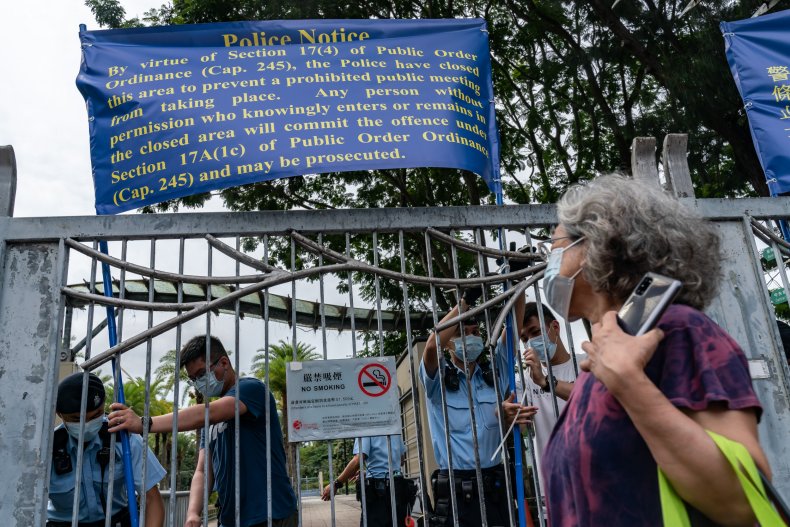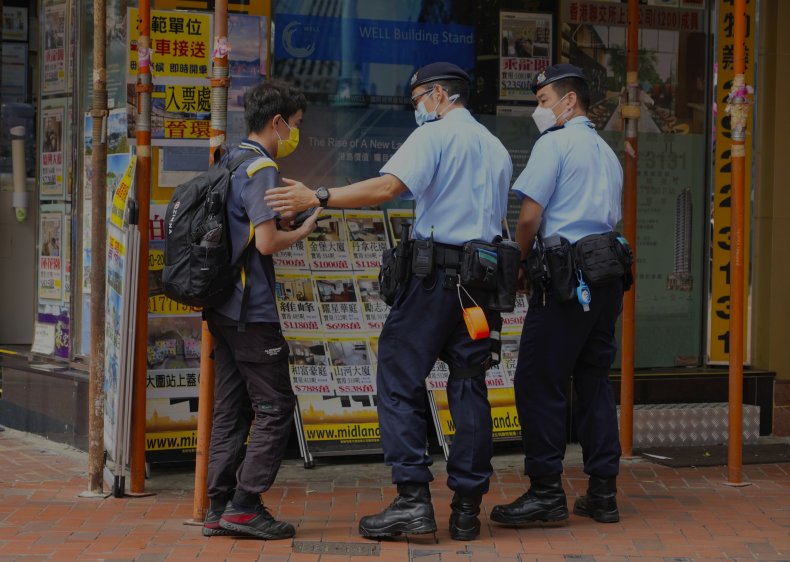Hong Kong Police Warn People Not to Attend Tiananmen Memorial, Arrest Organizer
Police in Hong Kong are warning residents not to attend the territory's annual candlelight vigil for victims of Beijing's Tiananmen Square massacre after arresting one of its organizers and cordoning off the vigil venue.
Each year, tens of thousands of people flock to Victoria Park to pay tribute to those killed when China's military drove tanks through student-led pro-democracy protests on June 4, 1989. The crackdown killed hundreds, if not thousands, and further sent China into isolation, the Associated Press reported.
The Chinese Communist Party has never allowed public events on the anniversary of Tiananmen Square on the mainland. Security was ramped up at Beijing Square, where police checked pedestrians' IDs.
To this day, Chinese officials say the use of force in Tiananmen Square was necessary because of how the country has flourished economically since the tragedy, citing the "political turmoil" of 1989 as proof that their decisions were sound.
For more reporting from the Associated Press, see below.

Efforts to suppress public memory of the Tiananmen events have lately turned to Hong Kong. A temporary June 4 museum closed after a visit from authorities earlier this week, and police then detained the vice chair of the Hong Kong Alliance, a group that organizes the museum and the vigil, on Friday morning.
The nighttime event in Victoria Park has been banned for a second year under coronavirus pandemic restrictions, although the city has had no local cases for over six weeks. The move came amid sweeping moves to quell dissent in the city, including a new national security law, election system changes and the arrest of many activists who participated in pro-democracy protests that swept Hong Kong in 2019.
Hong Kong police cordoned off parts of the park, including football fields and basketball courts, to try to prevent any gatherings. Police said they were aware of calls on social media urging people to turn up for the vigil.
"Police appeal to members of the public to refrain from participating in, advertising or publicizing any unauthorized assemblies and prohibited gatherings," a government statement said.
At the University of Hong Kong, students took part in an annual washing of the "Pillar of Shame" sculpture, which was erected to remember the victims of the Tiananmen crackdown. Charles Kwok, the president of the students' union, said the event was legal.
"In cleaning the Pillar of Shame, we shall learn how our predecessors defended the freedom of expression before, and we shall not easily give up," Kwok said.
Law Kwok-hoi, police senior superintendent, told reporters police arrested a 36-year-old woman from the Hong Kong Alliance, as well as a 20-year-old food delivery man, for advertising and publicizing an unauthorized assembly on their social media accounts even after the vigil was banned.
Taking part in an illegal gathering carries a maximum penalty of five years' imprisonment, while promoting such an event can result in a year in jail.
Police, following customary practice, did not name those arrested, but the Hong Kong Alliance confirmed that its vice chair, Chow Hang Tung, was the woman who had been picked up. After the ban was issued, Chow urged people to commemorate the event privately by lighting a candle wherever they are.
Last year, thousands went to Victoria Park despite the ban to light candles and sing songs. Police later charged more than 20 activists including Chow for participating in the event.
Two other key members of the Hong Kong Alliance—Lee Cheuk-yan and Albert Ho—are behind bars for joining unauthorized assemblies during the 2019 protests.
Chow, a lawyer, said in an earlier interview with AP that she expected to be jailed.
"I'm already being persecuted for participating and inciting last year's candlelight vigil," she said. "If I continue my activism in pushing for democracy in Hong Kong and China, surely they will come after me at some point, so it's sort of expected."
As Chinese authorities seek to curb remembrances, they seem confident the passage of time will erase memories of Tiananmen.
The government made no response to an appeal from Tiananmen Mothers, published on the Human Rights in China website, urging the party to release official records about the crackdown, provide compensation for those killed and injured, and hold those responsible to account.
Tiananmen Mothers said many young Chinese have "grown up in a false sense of prosperous jubilance and enforced glorification of the government (and) have no idea of or refuse to believe what happened on June 4, 1989."
The suppression of the Tiananmen commemorations has been accompanied in recent years by harsh repression of religious and ethnic minorities in Tibet, the northwestern region of Xinjiang and Inner Mongolia, along with the sharp curtailing of political rights in Hong Kong.
"China's authoritarian regime has used another kind of force—enforced amnesia—in its attempts to bury the truth of the brutal crimes it committed against its people," Human Rights in China said in a statement.
In self-governing Taiwan, activists who host an annual Tiananmen memorial moved mostly online as the island faces its worst outbreak of the coronavirus pandemic. A temporary memorial pavilion was set up in Taipei for people in small groups to leave flowers and other mementoes.
The U.S. State Department issued a statement of support for those advocating for victims and pursuing the truth.
"We must never stop seeking transparency on the events of that day, including a full accounting of all those killed, detained, or missing," the statement said, adding that such demands echo the struggle for political rights in Hong Kong.
Chinese Foreign Ministry spokesperson Wang Wenbin denounced the statement as interference in China's internal affairs and said the U.S. should "first look at itself in a mirror and reflect on its own poor record in human rights."
"In what position can the U.S. lecture others on human rights?" he said, citing the 1921 massacre of Black residents in Tulsa, Oklahoma, discrimination against minorities and U.S. actions in the Middle East.


